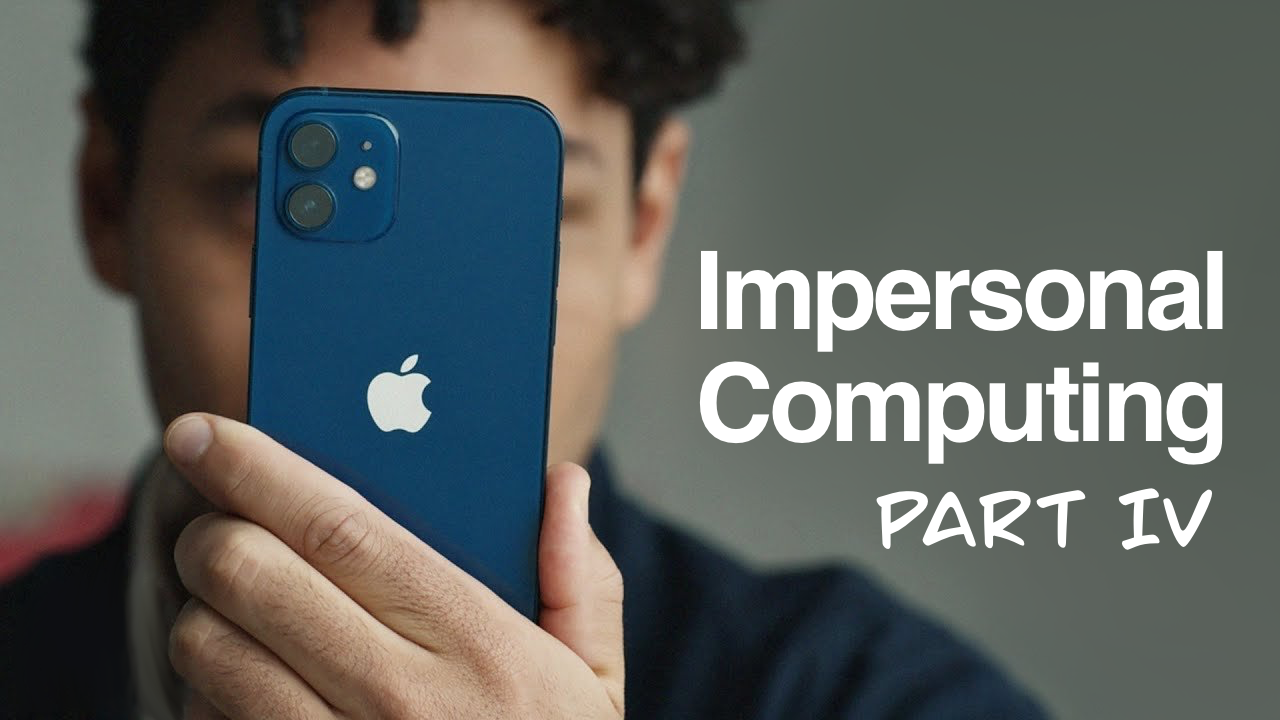Reflections On Being Personal

This is Part 4 of the Impersonal Computing series. Check out Part 1, Part 2, and Part 3.
I don't know about everyone else, but I've found it really hard to do anything online lately. It's not just consuming things on social media but also engaging in basic communication. Maybe it's that the never-ending scroll has infiltrated everything. Maybe it's because everything during the pandemic was online, and I have some version of Zoom/Whatsapp/Instagram/iMessage/general Internet fatigue. Maybe it's because working from home has neutered my social skills to the point when even saying hello to someone induces anxiety.
If you've been trying to get in touch with me - I'm sorry.
I was never bad at replying. I used to be the type of person who would always be at inbox zero, couldn't stand the red notification icon on apps on his phone, and would promptly reply to texts and messages. Now, I go weeks without checking my messages, and even when I see texts come in, I rarely respond (again, I'm so sorry).
I hate that being bad at replying has become part of my personality because it's quite rude not to engage with someone who attempts to speak with you. Not only does ignoring someone devalue their time and make them feel less than - it's not personal!
Recognizing this in myself was one of the main reasons for my reflection from my month of meditation: more often than not, modern technology amplifies our impersonal attitude toward relationships, which is the root cause of our dissatisfaction with life. That's also why I've called this series Impersonal Computing: one promise of personal computers is to foster connections with other people, but it's shown itself to do the opposite.
Some people may take offense to the idea that it's rude not to engage with someone who attempts to speak with you when online, claiming that online interactions are different than in-person interactions. There are also issues to be considered, such as online harassment being easier and the virtually unlimited number of social media followers making personal responses practically impossible. It's not that I don't empathize with or understand the struggles of this - being personal is difficult! But for most of us peasants with no clout, these situations don't especially apply to us.
So with that in mind, here are some things I've started to implement in my own life over the past few months about being more personal online:
- Unfollow or mute the influencers/anyone I haven't met IRL.
If my goal is to keep my social media presence personal, it makes little sense to interact with people digitally whom I don't know personally. - Set designated times to interact with social media/messages.
Total gamechanger. I put aside 15-20 minutes in the morning, afternoon, and evening to handle this stuff, and it's so freeing for the rest of the day because I know I'll get to it. - Make exceptions for the people close to you.
More of a follow-up on the previous point. I can think of certain people in my life for whom I will drop everything and reply ASAP. Make your own list: family, close friends, and maybe your partner if you have one. - Have areas of your living space where technology isn't allowed.
One thing my old roommate did was refuse to have phones in his bedroom. It's a little helpful, but I should probably invest in an alarm clock. - Keeping track of screen time somewhere that isn't your phone.
The Screen Time functionality on my iPhone is helpful, but using your phone to help you use your phone less seems self-defeating. Tracking the time I spend each day in a spreadsheet (I have spreadsheets for everything) forces me to consciously think about my screen time usage daily rather than the weekly updates from my phone. - Put the phone away when you're at an experience.
Consciously choosing to be present in the moment rather than preserving the concert/view/what we're eating on our phone helps us be more personal, as our attention is fully on what we're doing and who we're with.
Obviously, these are just suggestions. Do what works best for your own mental health - I'm just speaking on what has worked for me so far. I'm by no means an expert. However, none of these things matter if I can't control my mind - I can as easily choose to avoid these rules I set for myself as follow them. There's no external system that can act as a substitute for being fixed internally.
So the task now is to steady the mind. My personal observations (and those of the ancient Sanskrit texts I study) have some pretty clear conclusions. As anyone who tries to meditate for longer than 10 seconds knows, controlling the mind's wanderings is maybe the hardest thing to do. But how do we be attentive about our attention?
Regardless if we want to stick to the task at hand or on a vision for the future, we need want it. If we don't have any taste for the process, we can't give it our full attention. It doesn't matter how good healthy feels if we don't have any taste for healthy food - it simply isn't sustainable. We need some taste for the process if we want to steady our mind. This ADHD study is a great example: Star Wars is much more captivating for the student than the math video.
But what if we don't get any enjoyment out of the process? Then, the solution is to find the service in what you're doing. Asking yourself, "Who or what does what I do serve?" is powerful because it helps take us out of the self-centered mindset. I touched on this last week: getting our own ego out of the center of our actions is the key to going beyond the sufferings of impersonal relationships. When we serve, we engage in what is inherently a personal relationship.
The beauty of putting our ego aside and being in that service mindset is that it brings us satisfaction. This satisfaction is highest when done on the deepest levels of identity. We all can appreciate the sacrifice and service of those who sidestep their ego for something higher. The more layers of our ego we can shed (our name, our job, our race or our gender), the deeper we can go toward not only our truest nature, but also what unites everyone.
The more service we do on that deepest level, the more we can adopt a personal attitude. Swimming deeper into our inner worlds allows us to experience higher satisfaction. Especially when it comes to spiritual life, we need to be personal as spiritual practitioners because impersonal spirituality isn't going to get us to the deepest levels of satisfaction.

Hopefully, all this has been helpful and thought-provoking. I'm always eager to hear your reflections, comments, and feedback: here's how to contact me! If you've liked what I've written so far, please share Two Feet In The Boat with anyone who you think might find it interesting.
Happy to be here,
-Sid




